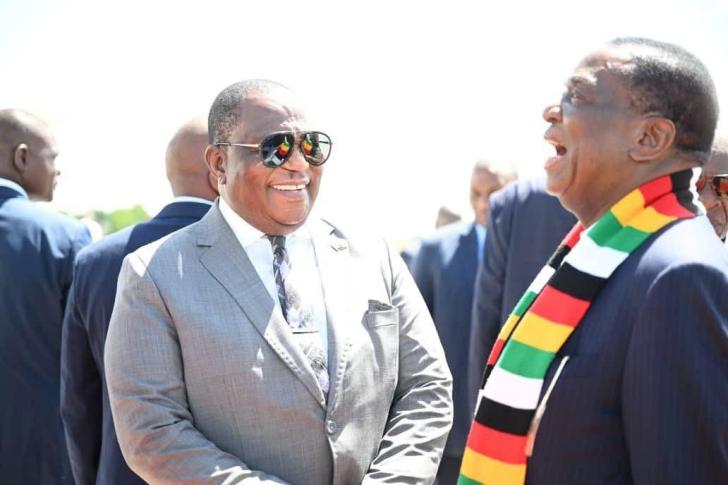News / National
Mnangagwa revives Guruve chieftainship
10 Feb 2025 at 06:32hrs |
0 Views

The people of Guruve District in Mashonaland Central Province have expressed their heartfelt gratitude to President Mnangagwa and the Second Republic for the revival of the Chimbwerere Chieftaincy, which was abolished by the colonial administration in 1963.
The chieftaincy, a symbol of resistance against colonial rule, was dismantled after its leaders refused to pay homage to a native district commissioner, Mr. Leat. However, following extensive archival research and consultations, the Second Republic has restored the revered traditional leadership structure.
Mr. Felix Alexander Chikowo, Chief Director of the Department of Traditional Leadership Support Services, confirmed the development, emphasizing the legal and constitutional basis for the reinstatement.
"I confirm that the Chimbwerere Chieftaincy was resuscitated by President Mnangagwa, who, according to the Constitution, has the mandate to restore chieftaincies abolished by the colonial administration," Mr. Chikowo said.
He explained that the President is empowered to revive chieftainships that were abolished due to colonial oppression but not those that became extinct through conquest. "Archival research revealed that the Chimbwerere Chieftaincy was abolished for resisting colonial rule, which justifies its revival," he added.
The next step involves the Provincial Assembly of Chiefs in Mashonaland Central selecting a candidate from the Chimbwerere clan, whose name will be submitted to the National Chiefs Council for formal installation. The process is expected to be completed by the end of this month.
Historical records trace the Chimbwerere Chieftaincy back to its founding leader, Chief Nyamanhindi, under the Chidziwo clan. Established by Mutota, a legendary figure in Zimbabwean history, the chieftaincy played a strategic role in guarding the eastern part of the Shinje River.
In the early 20th century, traditional leaders were required to register their chieftainships with colonial authorities. Chief Sumbu Chimbwerere sent emissaries to collect the recognition token (wachi) from Salisbury, now Harare. However, fearing a trap, the emissaries returned without completing the mission, recalling the tragic fate of Chief Nyamhondoro and his aides.
The chieftaincy was downgraded in 1963 when Johannes Chido Mutuwa was appointed Headman Chimbwerere by the colonial district commissioner, sparking discontent among the clan.
The revival of the chieftaincy has brought joy and hope to the Chimbwerere clan and the Guruve community. Mr. Washington Chidziwo, spokesperson for the clan, expressed profound gratitude to the Government.
"On behalf of the Chimbwerere clan, we thank President Mnangagwa and his Second Republic for resuscitating our chieftaincy. This move not only restores our heritage but also fills the administrative vacuum in communities under Chief Chimbwerere," he said.
He emphasized the potential for the chieftaincy to ensure that mineral resources, such as gold and chrome, benefit local communities in line with Vision 2030 and the President's mantra of "leaving no one and no place behind."
President Mnangagwa's administration has made significant strides in reviving chieftaincies abolished by the colonial regime. In March 2023, the Hwadalala Chieftaincy in Gwanda District was reinstated after being abolished over 70 years ago, while the Bere Chieftaincy in Mashava was revived in 2019 after nearly a century.
The resuscitation of the Chimbwerere Chieftaincy underscores the Second Republic's commitment to preserving Zimbabwe's cultural heritage and empowering local communities through traditional leadership.
The chieftaincy, a symbol of resistance against colonial rule, was dismantled after its leaders refused to pay homage to a native district commissioner, Mr. Leat. However, following extensive archival research and consultations, the Second Republic has restored the revered traditional leadership structure.
Mr. Felix Alexander Chikowo, Chief Director of the Department of Traditional Leadership Support Services, confirmed the development, emphasizing the legal and constitutional basis for the reinstatement.
"I confirm that the Chimbwerere Chieftaincy was resuscitated by President Mnangagwa, who, according to the Constitution, has the mandate to restore chieftaincies abolished by the colonial administration," Mr. Chikowo said.
He explained that the President is empowered to revive chieftainships that were abolished due to colonial oppression but not those that became extinct through conquest. "Archival research revealed that the Chimbwerere Chieftaincy was abolished for resisting colonial rule, which justifies its revival," he added.
The next step involves the Provincial Assembly of Chiefs in Mashonaland Central selecting a candidate from the Chimbwerere clan, whose name will be submitted to the National Chiefs Council for formal installation. The process is expected to be completed by the end of this month.
Historical records trace the Chimbwerere Chieftaincy back to its founding leader, Chief Nyamanhindi, under the Chidziwo clan. Established by Mutota, a legendary figure in Zimbabwean history, the chieftaincy played a strategic role in guarding the eastern part of the Shinje River.
The chieftaincy was downgraded in 1963 when Johannes Chido Mutuwa was appointed Headman Chimbwerere by the colonial district commissioner, sparking discontent among the clan.
The revival of the chieftaincy has brought joy and hope to the Chimbwerere clan and the Guruve community. Mr. Washington Chidziwo, spokesperson for the clan, expressed profound gratitude to the Government.
"On behalf of the Chimbwerere clan, we thank President Mnangagwa and his Second Republic for resuscitating our chieftaincy. This move not only restores our heritage but also fills the administrative vacuum in communities under Chief Chimbwerere," he said.
He emphasized the potential for the chieftaincy to ensure that mineral resources, such as gold and chrome, benefit local communities in line with Vision 2030 and the President's mantra of "leaving no one and no place behind."
President Mnangagwa's administration has made significant strides in reviving chieftaincies abolished by the colonial regime. In March 2023, the Hwadalala Chieftaincy in Gwanda District was reinstated after being abolished over 70 years ago, while the Bere Chieftaincy in Mashava was revived in 2019 after nearly a century.
The resuscitation of the Chimbwerere Chieftaincy underscores the Second Republic's commitment to preserving Zimbabwe's cultural heritage and empowering local communities through traditional leadership.
Source - The Herald
Join the discussion
Loading comments…

























